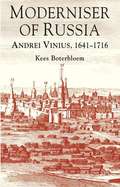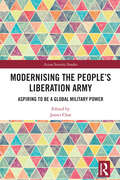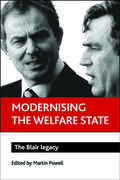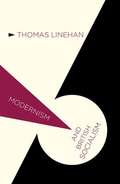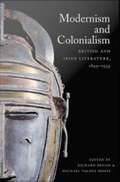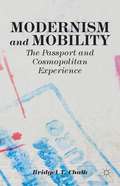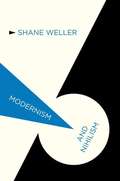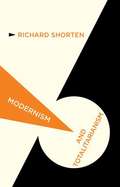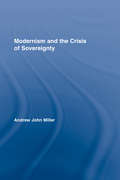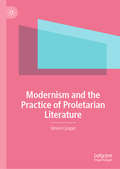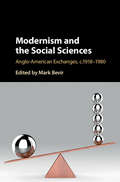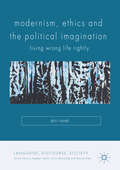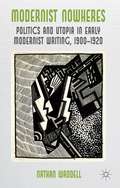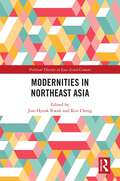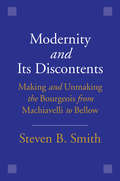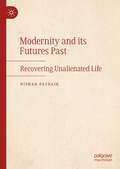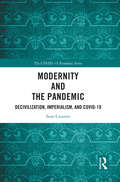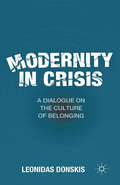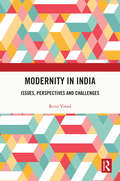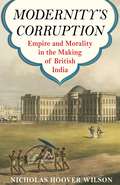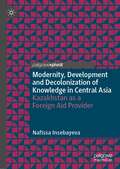- Table View
- List View
Moderniser of Russia
by Kees BoterbloemThis book investigates Russia's transformation into a European Power by way of the activities of the tsarist translator and official Andrei Vinius, who became an important advisor to Peter the Great. Vinius emerges as an influential conduit of Western culture and technology, who played a key role in transforming Muscovy into Russia.
Modernising the People’s Liberation Army: Aspiring to be a Global Military Power (Asian Security Studies)
by James CharThis volume examines the progress made by the Chinese military (the People’s Liberation Army, PLA) as it strives to meet its commander-in-chief’s directive to transform itself into a more capable fighting force.The book tracks the reforms undertaken by the PLA in meeting its commander-in-chief’s grand objectives set at the 2015 Central Military Commission Reform Work Meeting: for China’s armed forces to transform themselves into a more professional and modern military. Focusing on those changes since late 2016 at corps level and below, the first and second sections of the volume document the subsequent force structure and operational changes to the PLA’s four conventional services, and two newly established PLA branches: the Strategic Support Force and Joint Logistic Support Force. To that end, the contributors examine the reforms promulgated by the Chinese high command and measure them against observable developments in the PLA’s power-projection capabilities. In view of how the instrumentalization of military power is writ large in Beijing’s strategic calculus and in regional hotspot issues, the final part of the book also provides pathbreaking insights into two critical but not so well-understood phenomena: the now regular PLA aerial activities in the Taiwan Strait and the PLA Navy’s submarine operations in the South China Sea.This book will be of much interest to students of East Asian security, Chinese politics, and military and strategic studies in general.
Modernising the welfare state: The Blair legacy
by Edited by Martin PowellTony Blair was the longest serving Labour Prime Minister in British history. This book, the third in a trilogy of books on New Labour edited by Martin Powell, analyses the legacy of his government for social policy, focusing on the extent to which it has changed the UK welfare state. Drawing on both conceptual and empirical evidence, the book offers forward-looking speculation on emerging and future welfare issues. The book's high-profile contributors examine the content and extent of change. They explore which of the elements of modernisation matter for their area. Which sectors saw the greatest degree of change? Do terms such as 'modern welfare state' or 'social investment state' have any resonance? They also examine change over time with reference to the terms of the government. Was reform a fairly continuous event, or was it concentrated in certain periods? Finally, the contributors give an assessment of likely policy direction under a future Labour or Conservative government. Previous books in the trilogy are New Labour, new welfare state? (1999) and Evaluating New Labour's welfare reforms (2002) (see below). The works should be read by academics, undergraduates and post-graduates on courses in social policy, public policy and political science.
Modernism and British Socialism
by Thomas LinehanThomas Linehan offers a fresh perspective on late Victorian and Edwardian socialism by examining the socialist revival of these years from the standpoint of modernism. In so doing, he explores the modernist mission as extending beyond the concerns of the literary and artistic avant-garde to incorporate political and social movements.
Modernism and Colonialism: British and Irish Literature, 1899-1939
by Richard Begam Michael Valdez MosesThis collection of essays by renowned literary scholars offers a sustained and comprehensive account of the relation of British and Irish literary modernism to colonialism. Bringing postcolonial studies into dialogue with modernist studies, the contributors move beyond depoliticized appreciations of modernist aesthetics as well as the dismissal of literary modernism as irredeemably complicit in the evils of colonialism. They demonstrate that the modernists were not unapologetic supporters of empire. Many were avowedly and vociferously opposed to colonialism, and all of the writers considered in this volume were concerned with the political and cultural significance of colonialism, including its negative consequences for both the colonizer and the colonized. Ranging over poetry, fiction, and criticism, the essays provide fresh appraisals of Joseph Conrad, T. S. Eliot, Ezra Pound, Virginia Woolf, D. H. Lawrence, Wyndham Lewis, E. M. Forster, W. B. Yeats, James Joyce, Elizabeth Bowen, Hugh MacDiarmid, and Evelyn Waugh, as well as Robert Louis Stevenson and H. Rider Haggard. The essays that bookend the collection connect the modernists to their Victorian precursors, to postwar literary critics, and to postcolonial poets. The rest treat major works written or published between 1899 and 1939, the boom years of literary modernism and the period during which the British empire reached its greatest geographic expanse. Among the essays are explorations of how primitivism figured in the fiction of Lawrence and Lewis; how, in Ulysses, Joyce used modernist techniques toward anticolonial ends; and how British imperialism inspired Conrad, Woolf, and Eliot to seek new aesthetic forms appropriate to the sense of dislocation they associated with empire. Contributors. Nicholas Allen, Rita Barnard, Richard Begam, Nicholas Daly, Maria DiBattista, Ian Duncan, Jed Esty, Andrzej Gąsiorek, Declan Kiberd, Brian May, Michael Valdez Moses, Jahan Ramazani, Vincent Sherry
Modernism and Its Margins: Reinscribing Cultural Modernity from Spain and Latin America (Hispanic Issues)
by José B. Monleón Anthony L. GeistThis volume represents a rereading of modernism and the modernist canon from a double distance: geographical and temporal. It is a revision not only from the periphery (Spain and Latin America), but from this new fin de si cle as well, a revisiting of modernity and its cultural artifacts from that same postmodernity. Modernism and Its Margins is an attempt at introducing different perspectives and examples in the theoretical debate, redefine dominant assumptions of what modernism-or margins-mean in our historical juncture.
Modernism and Mobility
by Bridget T. ChalkTracing the changing conceptions of nationality in the work of traveling writers such as D. H. Lawrence, Gertrude Stein, and Claude McKay, Modernism and Mobility argues that the passport system is an indispensable segue into discussions of literary modernism.
Modernism and Nihilism
by Shane WellerFocusing on a wide range of philosophers and writers, from Nietzsche to Derrida and Flaubert to Borges, this book charts the history of the deployment of the concept of nihilism within the discourses of philosophical and aesthetic modernism and considers the similarities and differences between modernist and postmodernist approaches to nihilism.
Modernism and Totalitarianism
by Richard ShortenWhat is totalitarianism? In what ways was it modern? Modernism and Totalitarianism argues that conventional theories of totalitarianism are too focused on the state and fail to take note of its ideological trajectory. The book analyses this trajectory, shared by Nazism and Stalinism, the two instances of totalitarianism in its 'classical' form. The ideological trajectory was formed in the interaction of three currents of modernist thought: utopianism, scientism, and revolutionary violence. Developing first of all in the nineteenth century, and in reaction to the Enlightenment mainstream, each of these three currents contributed to the idea of the totalitarian New Man. The book considers a broad range of theoretical positions, including those associated with Cold War liberalism, critical theory, and recent anti-totalitarian thought in France, in order to develop these arguments.
Modernism and the Crisis of Sovereignty (Routledge Studies in Twentieth-Century Literature #4)
by Andrew John MillerThis book describes how three of the most significant Anglophone writers of the first half of the twentieth century – Yeats, Eliot, and Woolf – wrestled with a geopolitical situation in which national boundaries had come to seem increasingly permeable at the same time as war among (and within) individual nation-states had come to seem virtually inescapable. Drawing on Jean-François Lyotard's analysis of the elements of performativity in J.L. Austin's speech act theory, and making critical use of Carl Schmitt’s writings on sovereignty and world order, Miller situates the writings of Yeats, Eliot, and Woolf in the context of what Lyotard describes as a "civil war of language." By virtue of its dissolution of any clear boundary between "interiority" and "exteriority," as well as by virtue of its resistance to any decisive form of resolution or regulation, this "civil war of language" takes on dimensions that are ultimately global in scope. Miller examines the emergence of modernism as bound up with a crisis of personal, political, and aesthetic sovereignty that undermined traditional distinctions between the public and private. In the process, he directly engages with the theoretical discourse surrounding the geopolitical impact of globalization and biopolitics: a discourse that is central to the influential and widely-debated work of such varied figures as Carl Schmitt, Hardt and Negri, Giorgio Agamben, and Jean-Luc Nancy. This book will be of interest to anyone concerned not only with twentieth-century literature but also with questions of nationalism and globalization.
Modernism and the Practice of Proletarian Literature
by Simon CooperThis book tests critical reassessments of US radical writing of the 1930s against recent developments in theories of modernism and the avant-garde. Multidisciplinary in approach, it considers poetry, fiction, classical music, commercial art, jazz, and popular contests (such as dance marathons and bingo). Relating close readings to social and economic contexts over the period 1856–1952, it centers in on a key author or text in each chapter, providing an unfolding, chronological narrative, while at the same time offering nuanced updates on existing debates. Part One focuses on the roots of the 1930s proletarian movement in poetry and music of the nineteenth and early twentieth centuries. Part Two analyzes the output of proletarian novelists, considered alongside contemporaneous works by established modernist authors as well as more mainstream, popular titles.
Modernism and the Social Sciences: Anglo-American Exchanges, c.1918–1980
by Mark BevirThis wide-ranging and original study reveals how prevalent modernism has become in the social sciences. With contributions from a number of leading international scholars, Modernism and the Social Sciences explores the rise and nature of modernist tropes and approaches within social sciences such as economics, econometrics, behaviourism, sociology, administrative science, linguistics, history and anthropology. The essays demonstrate how the social sciences turned away from the developmental historicisms of the nineteenth century. Instead, social scientists have become increasingly committed to synchronic and formal explanations that rely on models, correlations and ideal types, and they have increasingly appealed to systems and functions and to institutions and norms. This book will reveal wider trends and parallels to specialists in particular disciplines and it will also appeal to those interested in intellectual history and social science theory. This volume is a companion to Historicism and the Human Sciences in Britain, a product of the Mellon project on Britain's Modernity, published by Cambridge in 2017.
Modernism at the Barricades: Aesthetics, Politics, Utopia (Columbia Studies In Political Thought/Political History (coup))
by Stephen Eric BronnerStephen Eric Bronner revisits the modernist project's groundbreaking innovations, itsexperimental imagination, and its utopian politics. Reading the artistic and intellectual achievements of the movement's leading figures against larger social, political, and cultural trends, he follows the rise of a flawed yet salient effort at liberation and its confrontation with modernity.Modernism at the Barricades features chapters on expressionism, futurism, surrealism, and revolutionary art and includes fresh perspectives on the work of Arnold Schoenberg, Wassily Kandinsky, and Emil Nolde, among others. The volume illuminates an international avant garde intent on resisting bureaucracy, standardization, scientific rationality, and the increasing commodification of mass culture. Modernists sought new ways of feeling, new forms of expression, and new possibilities of experience while seeking to refashion society. Liberation was their aim, along with the invigoration of daily life—yet their process entangled political resistance with the cultural. Exploring both the political responsibility of the artist and the manipulation of authorial intention, Bronner reconfigures the modernist movement for contemporary progressive purposes and offers insight into the problems still complicating cultural politics. He ultimately reasserts the political dimension of developments often understood in purely aesthetic terms and confronts the self-indulgence and political irresponsibility of certain so-called modernists today. The result is a long overdue reinterpretation and rehabilitation of the modernist legacy for a new age.
Modernism in the Streets: A Life and Times in Essays
by Marshall Berman David Marcus Shellie SclanEssays tracing the intellectual life of a quintessential New York City writer and thinkerMarshall Berman was one of the great urbanists and Marxist cultural critics of the twentieth and twenty-first centuries, and his brilliant, nearly sui generis book All That Is Solid Melts Into Air is a masterpiece of the literature on modernism. But like many New York intellectuals, the essay was his characteristic form, accommodating his multifarious interests and expressing his protean, searching exuberant mind. This collection includes early essays from and on the radical ’60s, on New York City, on literary figures from Kafka to Pamuk, and late essays on rock, hip hop, and gentrification. Concluding with his last essay, completed just before his death in 2013, this book is Berman’s intellectual autobiography, tracing his career as a thinker through the way he read the “signs in the street.””
Modernism, Ethics and the Political Imagination
by Ben WareIn this groundbreaking new study, Ben Ware carries out a bold reassessment of the relationship between modernism and ethics, arguing that modernist literature and philosophy offer more than simply a snapshot of the moral conflicts of the past: they provide a crucial point of reference for today's emancipatory struggles. Modernism in this assessment is characterized not only by a concern with language and aesthetic creativity, but also by a preoccupation with the question of how to live. Investigating ethical ideas in Wittgenstein, Beckett, Kierkegaard, Kant, Cavell, Marx, Henry James and Lacan, Ware demonstrates how these thinkers can bring us to a new understanding of a constellation of issues which contemporary radical thought must re-visit: utopia, repetition, perfectionism, subtraction, negativity, critique, absence, duty, revolution and political love. The result is a timely and provocative intervention, which re-draws the boundaries for future debates on the ethics and politics of modernism.
Modernist Nowheres
by Nathan WaddellModernist Nowheres explores connections in the Anglo-American sphere between early literary modernist cultures, politics, and utopia. Foregrounding such writers as Conrad, Lawrence and Wyndham Lewis, it presents a new reading of early modernism in which utopianism plays a defining role prior to, during and immediately after the First World War.
Modernist Voyages
by Anna SnaithLondon's literary and cultural scene fostered newly configured forms of feminist anticolonialism during the modernist period. Through their writing in and about the imperial metropolis, colonial women authors not only remapped the city, they also renegotiated the position of women within the empire. This book examines the significance of gender to the interwoven nature of empire and modernism. As transgressive figures of modernity, writers such as Jean Rhys, Katherine Mansfield, Una Marson and Sarojini Naidu brought their own versions of modernity to the capital, revealing the complex ways in which colonial identities 'traveled' to London at the turn of the twentieth century. Anna Snaith's timely and original study provides a new vantage point on the urban metropolis and its artistic communities for scholars and students of literary modernism, gender and postcolonial studies, and English literature more broadly.
Modernities in Northeast Asia (Political Theories in East Asian Context)
by Jun-Hyeok Kwak Ken ChengTo form a truer portrait of Northeast Asian perspectives on modernity, this book presents a broad range of analyses from philosophical and political-philosophical scholars specializing in the region. The book considers the encounter between "Western" modernity and "Eastern" tradition not as a simple clash of cultures, but as a generative and hybridizing process of negotiation. It examines the concrete manifestations of modernity in various intellectual and political movements that attempted to radically restructure Northeast Asian societies. And through these situated perspectives, it rethinks and redefines the idea of "modernity" itself, challenging and presenting alternatives to Western-centric thinking on the topic. This book will be of particular interest to political philosophers, political theorists, comparative philosophers, regional specialists in East Asia, and all scholars grappling with the perplexities of global "modernity."
Modernity and Its Discontents: Making and Unmaking the Bourgeois from Machiavelli to Bellow
by Steven B. SmithSteven B. Smith examines the concept of modernity, not as the end product of historical developments but as a state of mind. He explores modernism as a source of both pride and anxiety, suggesting that its most distinctive characteristics are the self-criticisms and doubts that accompany social and political progress. Providing profiles of the modern project's most powerful defenders and critics--from Machiavelli and Spinoza to Saul Bellow and Isaiah Berlin--this provocative work of philosophy and political science offers a novel perspective on what it means to be modern and why discontent and sometimes radical rejection are its inevitable by-products.
Modernity and its Futures Past: Recovering Unalienated Life
by Nishad PatnaikThe work reimagines emancipatory possibilities in the face of reified capitalist modernity. The enlightenment resulted in a ‘disenchanted’ world, stripped of ‘anthropomorphised’ meaning and purpose. This world, in its capitalistic figuration, alienates us from others, and from nature. To rearticulate emancipatory possibilities requires a non-alienated relation to society and nature. Yet, modernist disenchantment cannot be undone by returning to pre-modern ‘enchantment’. Rather, such rearticulation calls for the recovery of ‘unalienated life’ from within non-reified modernity, by renewing its universalist dimension.
Modernity and the Pandemic: Decivilization, Imperialism, and COVID-19 (The COVID-19 Pandemic Series)
by Sean CreavenModernity and the Pandemic: Decivilization, Imperialism, and COVID-19 applies the tools of critical social theory to make sense of the COVID-19 crisis and presents a critical sociological analysis of aspects of the political and community response to the pandemic. The book focuses on key themes integral to a sociology of pandemics in the ‘global’ age. Firstly, Creaven argues that cultures of individualism and consumerism, and of pervasive and deeply entrenched social inequalities (i.e. decivilization) significantly weaken the cause of public health by weakening the compliance of people with state-mandated non-pharmaceutical interventions (including and especially physical distancing rules) and encouraging vaccine hesitancy. Secondly, Creaven examines how interstate competition and imperial politics has undermined an effective global policy response to the COVID-19 pandemic. Policy failure with regard to the management of the pandemic is interpreted as being rooted in the dominance of neoliberal ideology and governance in the politics of international relations, particularly in the politics of the leading state actors, by protection of corporate interests at the expense of public health, and in the constraints imposed on state actors by the competitive dynamic of multinational capitalism in the ‘global’ age. Modernity and the Pandemic will appeal to scholars in the humanities and social sciences with interests in neoliberalism and its social, cultural and epidemiological impacts.
Modernity in Crisis
by Leonidas DonskisA blend of political theory, social theory, and philosophy of culture, the book will show the relationship and tension between thought and action, politics and literature, power and dissent in modern politics and culture.
Modernity in India: Issues, Perspectives and Challenges
by Renu VinodThis book introduces a sociological understanding of the emergence of modernity in India and its ramifications on society, economy, and polity. It outlines the main features and context of modernity, as described in classical and later texts of modernity. The essays examine the transformation of Indian society as a consequence of the British colonial encounter resulting in social, economic, and political interventions. It also delineates the Indian context by defining the term community, and its close association with caste and religion, and subsequently examines the challenges in building a pan-Indian or national consciousness with a sense of ‘we-ness’ or common identity. Most importantly, the book also studies the politics of government formation after independence, and the role of dominant castes and classes in gaining power at the Centre. The book concludes with an outline of the definitions and historical practices of social exclusion in India, their contemporary configurations, the image of a socially, economically, and politically exclusive Indian modernity that poses challenges to the Indian state and civil society on account of the exclusion of multiple groups. This book would be useful to the students, researchers and teachers of sociology, women and gender studies, history, economics, political science, and other interdisciplinary courses in social sciences. The book will also be valuable reading for those interested in South Asian studies, especially post-colonial contemporary Indian society.
Modernity's Corruption: Empire and Morality in the Making of British India
by Nicholas Hoover WilsonToday, “corruption” generally refers to pursuing personal interests at the expense of one’s responsibilities, the law, or the common good. It calls to mind some official violating their public duty for private gain, suggesting seamy bureaucracies taking payoffs, kickbacks, and bribes. Yet at other times, notions of corruption were rooted in a more expansive view of the causes of people’s behavior and the appropriate ways to regulate conduct. In this understanding, to be “corrupt” meant losing a delicate balance among competing appetites under specific circumstances and in the eyes of peers. Why did a narrower definition of corruption become dominant?Nicholas Hoover Wilson develops a new account of the changing category of corruption by examining the English East India Company and its transformation from a largely commercial enterprise to a militarized offshoot of British empire in the eighteenth and nineteenth centuries. He argues that the modern idea of corruption arose as an unintended consequence of conflicts among company officials and the changing audiences to which they justified themselves in Britain. This new understanding unified an imperial elite at risk of fragmenting into irreconcilable moral worlds and, in the process, helped redefine the boundaries of state, society, and economy. Modernity’s Corruption is at once a novel historical sociology of imperial administration and its contradictions, a fresh argument about the nature of corruption and its political and organizational effects, and a reinvigoration of classic arguments about the nature and consequences of global modernity.
Modernity, Development and Decolonization of Knowledge in Central Asia: Kazakhstan as a Foreign Aid Provider (Politics and History in Central Asia)
by Nafissa InsebayevaThis book joins the discussion on foreign aid triggered by the rise of multiplicity of emerging donors in international development and explores the transformation of Kazakhstan from a recipient country to a development aid provider. Drawing on fieldwork in Nur-Sultan and Almaty (Kazakhstan) between 2016 and 2019, this research evaluates the philosophy and core features of Kazakhstan’s chosen development aid model and explains the factors that account for the construction of aid patterns of Kazakh donorship. This book will be of interest to scholars of Central Asia and the emerging politics of Eurasia as well as scholars of politics and aid.
